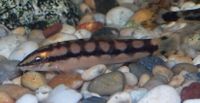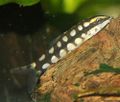Dwarf Chain Loach (Yasuhikotakia sidthimunki)
From The Aquarium Wiki
Dwarf Chain Loach
Yasuhikotakia sidthimunki
57 Litres (15 US G.)
5.1-6.4cm (2-2.5 ")
Freshwater
6.5 - 8.0
26 -28 °C (78.8-82.4°F)
6-20 °d
2:3 M:F
8-12 years
Family
Cobitidae
Contents
Additional names
- Dwarf Chain Loach, Dwarf Botia, Chain Loach, Dwarf Loach, Ladderback Loach, Pygmy Loach
Additional scientific names
- Botia sidthimunki, Botia sidthimunkii
Origin
|
|
This section requires expansion with: Location where this animal is found in the wild. |
Sexing
- Mature females will be broader in the mid-section and longer, otherwise difficult to sex. An egg scatterer, but breeding is unknown in captivity. Though artifical hormones can induce breeding, see link below.
Tank compatibility
- A generally peaceful community fish but it's very high activity levels may bother more docile or shy fish, especially those that share the same areas of the tank. Can nip at fins of slow moving fish.
Diet
- Eats flake on substrate, catfish pellet food, Frozen Blood Worms, Brine Shrimp, Tubifex Worms. Care should be taken when feeding live foods to ensure no parasites are being carried. Likes to eat small snails when adult.
Feeding regime
- Feed once or twice a day.
Environment Specifics
- Likes a place to hide at night and the company of its own kind. Keep in a group of 4 or more. Appreciates a good current and may burrow under logs to find an area of seclusion if no caves are provided.
Behaviour
- One of the few Loaches that is highly active during the day. It will often school midwater and along the bottom with others of its kind or rest on leaves and it is a generally peaceful fish, recommended as a bustling community fish with other active fish.
Identification
- Small, active, has a pattern of chain like black bands running down its back against a silver/cream body. Has a flash of gold behind its eye.
Special Notes
- Was originally named as Botia sidthimunki by Klausewitz in 1959. Renamed by Kottelat in 2004. This fish is critically endangered with a very high risk of extinction in the wild. So please don't buy a wild caught fish.
- This fish has a lockable, bifid spine under each eye, so take care when in a net or handling.
Pictures
2xDCL and a Dwarf Oto
External links
- Fishbase (Mirrors:
 )
)





